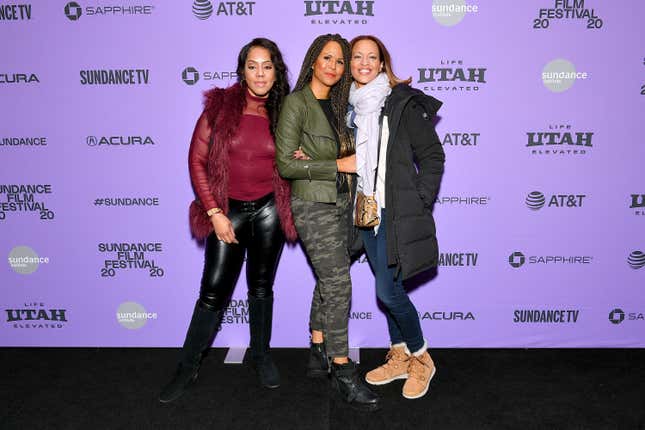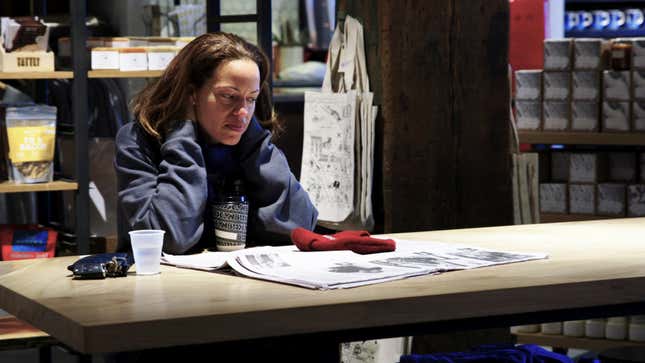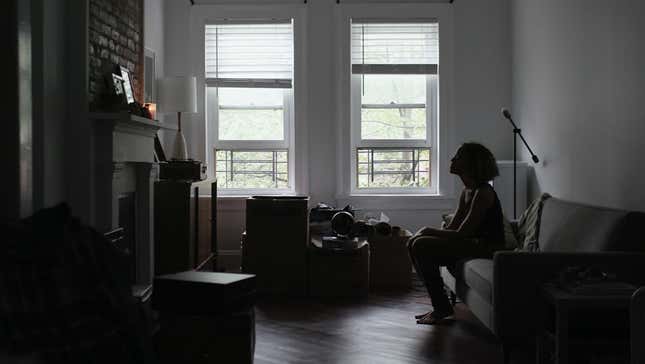
On the Record has been a very long time coming. Beyond the unfortunately standard silencing of black women, the 2020 Sundance Film Festival pick has had its share of distribution drama. Eventually, it found a home in newly launched streaming platform HBO Max and has been released during a timely moment in our culture—the era of self-isolation.
The synopsis of the documentary, via HBO Max’s press release:
Directed and produced by Kirby Dick and Amy Ziering (The Hunting Ground, The Invisible War), and first reported by The New York Times, On the Record presents the haunting story of music executive Drew Dixon as she grapples with her decision to become one of the first women of color, in the wake of #MeToo, to come forward and publicly accuse hip-hop mogul Russell Simmons of sexual misconduct. The film chronicles not only Dixon’s story, but that of several other accusers—Sil Lai Abrams, Sheri Sher —delving deeply into the ways women of colors’ voices are all too often silenced and ignored when reporting these stories; as well as the various cultural forces that conspire to make them reluctant to do so.
Trigger Warning: The following article contains details of several accounts of alleged sexual assault.
To date, Simmons has been publicly accused of sexual assault and sexual misconduct by 20 women. Three of those women, Dixon, Abrams and Sher bravely recounted similar claims involving Simmons’ wielding their passion of music to lure them to a private space such as his bedroom or office to rape them. According to the documentary, the filmmakers reached out to both Simmons and record executive L.A. Reid (who Dixon claims attempted to coerce her into his hotel room while she worked at Arista and when she refused, sabotaged her potential deals with John Legend and Kanye West) and while both declined to appear in the film, they each have made statements denying the accusations against them in the film.
Over a series of phone calls, I sat down with each of the women in the doc, with a central goal of discussing how we unpack a system deeply immersed in misogynoir and how that system continues to allow predatory gatekeepers to thrive.
“[Black women] have been vulnerable to sexual violence from the second we lost our bodily autonomy in the Atlantic slave trade. And we continue to be uniquely vulnerable, less believed and conflicted because sexual violence is almost always racial,” Dixon told The Root. “It’s typical that a black woman’s abuser is a black man, and it’s typical that a white woman’s abuser is a white man. For us, we faced this double bind of not wanting to add to the dangerous mythology of the hypersexualization, predatory behavior or the inherently violent behavior of black men.”
During an especially poignant moment in the film, we’re taken to the very moment Dixon first held the print copy of the 2017 New York Times report where she first went “on the record” with her accusations against Simmons.

In her 2018 guest column at The Hollywood Reporter, Abrams, an author, activist and self-proclaimed “radical black feminist,” detailed her account that she was raped by Simmons in 1994 as well as sexually assaulted by former 106 & Park and Extra co-host A.J. Calloway. Since we didn’t get a similar visual peek into Abrams’ moment, I asked what that moment was like for her. Along with the initial anxiety that comes with your name forever being attached to a high-profile and powerful figure, Abrams says she grappled with telling her children that the “godfather of hip-hop had harmed their mother.” Further, Abrams wants to “disabuse this notion that women come forward for notoriety, fame and fortune” and is looking forward to “finally exhaling” on the doc’s release date.
“Then, there’s the silence,” Abrams recalled. “Everyone gets to leave. [They] don’t want to be affiliated with you because they have a friend who still rolls with Russell. You know, ‘the six degrees of [separation with] Kevin Bacon’? There’s two degrees of Russell Simmons. I mean, that’s painful. Not just the calls you get from people with ulterior motives, but the absolute silence from the people that you thought were your acquaintances and friends. [There is an] abandonment that occurs.”
Sher felt a similar sense of loneliness and isolation, which is why the moment captured onscreen when the three women meet in person for the first time is so significant.
“When this happened to me, it was nobody else around that I knew this [had] ever happened to,” hip-hop pioneer and author Sher told The Root, confirming that this experience has been “overwhelming” for her. “So I had to keep quiet. Russell was considered the god in hip-hop and was bringing hip hop into a major league. So for me to come out then, I would [have received] backlash from my community [in general] and in the hip hop community.”
A central thesis of the documentary examines the idea of the “perfect victim.” As the #MeToo movement gained more notoriety, it wasn’t lost on black women that the women at the forefront of the movement didn’t look like them, despite the existence of the black woman who started the movement, Tarana Burke (who was also almost erased, if it weren’t for the intentional efforts via social media and black-centered media to ensure that didn’t happen). In both the doc and their subsequent interviews with me, the three ladies acknowledged how their beauty and light-skinned privilege were a factor on whether or not their stories would be heard on a major platform.
“I sort of checked a bunch of boxes that I never asked to check, [but] I could take advantage of that unique privilege and those overlapping privileges I had to push the conversation forward,” Dixon said. “I sort of felt like I had an Aaliyah moment: It’s like, is it your go, or is it my go? It’s my go.”
“My hope is that when a brown-skinned woman who is not involved in the entertainment industry, whose assailant is not famous...sees this film and she doesn’t feel erased,” Abrams mued. “She doesn’t think that her experience is less valid because the feelings of shame, of self-blame, of feeling voiceless, of fear from coming forward—all of that, it is similar.”
At one point in the documentary, Dixon said something that stood out to me as a feeling black women, in general, could relate to. “I loved the culture. I loved Russell, too,” Dixon said in the doc. Growing up fully immersed into hip-hop with even a modicum of self-conscious spirit, we’re forced to not only reconcile with our love for hip-hop and its artists but the deeply rooted misogynoir fuel that runs such an engine.
“One thing I do appreciate about the documentary is that it does point out misogyny in rock and roll and in pop music—the really toxic, destructive, violent, anti-woman imagery and language [that] exists in white music...in all music is pervasive,” Dixon told The Root. “It’s part of a broader culture. But, the extent to which we, in hip hop, just really leaned all the way in and it became almost dominant. The scantily clad women, the really violent language became not the exception, but the rule. And I just think it’s important for us to ask ourselves, sitting around in a room making these decisions, is this really what we want to do? We can make money, but is this really who we want to be?”

As writer-producer Bim Adewunmi said in the doc, black women are “more likely to be harmed and less likely to be believed.”
“We’re united, yet at the same time we have to acknowledge the fact that often the harm and the wounds that come and hit the deepest come from our sisters,” Abrams noted. “There are many defenders of perpetrators of sexual violence. You see it all the time. We do. And certainly, I have called out people through my writings who have chosen to stay and to maintain the relationships with Russell and are unapologetic about it. It’s very sad. So, while we are all we have, we have a long way to go.”
Within the black community, there has been a longstanding fear of “losing” something significant when protecting Simmons and other black male gatekeepers in music (such as R. Kelly or Michael Jackson) But was it ultimately worth it if that “protection of culture” has been done on the backs of the black women who have historically upheld said culture?
Sher certainly hesitated to speak out at the time of her alleged assault for myriad reasons, given the risk and burdens placed upon her, especially as a pioneer in the game. “You get ready to blow up somebody’s [spot] who is bringing people into the [spot]light and putting the food on a table. That would have been a disaster.”
As such, we can’t help but wonder about the ultimate sacrifice these women made to mitigate such a “disaster.” Toward the end of On the Record, writer-editor Kierna Mayo beautifully expressed something in a way that remained with me days after I watched my screener: What potential contributions did we miss out on in hip-hop from these women by silencing them?
Dixon took a line from Method Man’s interlude (“Shorty, I’m there for you; anytime you need me…”) and through her ideation of the concept of a “hip-hop sonnet,” she is now the reason we have the iconic “I’ll Be There For You/You’re All I Need” duet with Mary J. Blige. Abrams continued fighting against the dehumanization of black women—work certainly needed within the hip-hop space—and her voice toward media advocacy would’ve been beneficial at a major hip-hop label such as Def Jam. Sher is the founding member of the very first all-female hip-hop group, Mercedes Ladies. This is the “culture.” What do we do when we realize the culture has failed them?
On The Record is currently available to stream on HBO Max.
As noted in the footnote of the documentary, if you are a survivor of sexual harassment or assault and you need assistance, you can contact:
RAINN’s National Sexual Assault Hotline
800-656-4673
Black Women’s Blueprint Hotline
646-647-5414
This interview has been edited and condensed for clarity.

